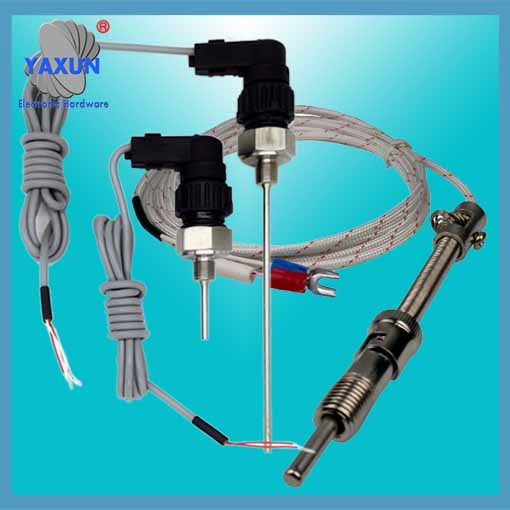Categorii de produse
- Întrerupător termic 20
- Suport cutie siguranțe 36
- Senzor de temperatura 67
- Comutator termic 64
- Siguranță auto 19
- Siguranțe înșurubate 7
- siguranță termica 32
- siguranțe de suprafață 12
- termistor 22
- Suport pentru siguranțe montat pe PCB 27
- Ham de cabluri 6
- Suporturi pentru siguranțe cu lame 17
- termostat 46
- Siguranta electrica 14
Etichete de produs
Postări recente
manufacturer of armored thermocouples sensor
Armored thermocouples sensor are the same as industrial assembled thermocouples. Ca senzor de temperatură, it is usually used in conjunction with display instruments, recording instruments and electronic regulators. În același timp, it can also be used as a temperature sensing element for assembled thermocouples.
What is an armored thermocouple sensors?
Armoured thermocouples are used as temperature measurement sensors and are usually used in conjunction with temperature transmitters, regulators and display instruments to form a process control system. It is used to directly measure or control the temperature of fluid, steam, gas medium and solid surface in the range of 0-1800℃ in various production processes. Armored thermocouples sensors have many advantages such as flexibility, high pressure resistance, fast thermal response time, sturdiness and durability. It is the same as an industrial assembled thermocouple, and is usually used in conjunction with display instruments, recording instruments and electronic regulators.
Thermocouples sensor used internationally have a standard specification. It is stipulated that the thermocouple is divided into eight different graduations, namely B, R, S, K, N, E, J and T. The lowest temperature can be measured at minus 270℃, and the highest temperature can reach 1800℃. Among them, B, R and S belong to the platinum series of thermocouples sensor. Because platinum is a precious metal, they are also called precious metal thermocouples. The remaining few are called cheap metal thermocouples. There are two types of thermocouple structures, common type and armored type. Ordinary thermocouples are generally composed of hot electrodes, insulating tubes, protective sleeves and junction boxes. While the sheathed thermocouple is: a thermocouple wire, the protective insulating material and the metal rear sleeve assembly combination of the three, the processing of a stretched solid combination. Cu toate acestea, the electrical signal of the thermocouple needs a special wire to transmit, and this wire is called a compensation wire. Different thermocouples require different compensating wires, and their main function is to connect with the thermocouple to keep the reference end of the thermocouple away from the power supply, so that the temperature of the reference end is stable. Compensation wires are divided into two types: compensation type and extension type. The chemical composition of the extension wire is the same as that of the thermocouple to be compensated, but in practice, the extension wire is not made of the same material as the thermocouple. În general, it is replaced by a wire with the same electron density as the thermocouple sensor. The connection between the compensation wire and the thermocouple is generally very clear. The positive connection compensation wire of the thermocouple is a red wire, and the negative connection is connected to the remaining color wire. Most of the general compensation wires are made of copper-nickel alloy.

Armoured thermocouple probe sensors in different packages
Armored thermocouples sensor are the same as industrial assembled thermocouples. Ca senzor de temperatură, it is usually used in conjunction with display instruments, recording instruments and electronic regulators. În același timp, it can also be used as a temperature sensing element for assembled thermocouples. It can directly measure the temperature of liquid, steam and its gaseous medium and solid surface in the range of 0℃~800℃ in various production processes. Compared with fabricated thermocouples, armored thermocouples have the advantages of flexibility, high pressure resistance, short thermal response time, sturdiness and durability.
Because the materials of armored thermocouples are generally more expensive (especially when precious metals are used), the distance between the temperature measurement point and the meter is very long. In order to save armored thermocouple materials and reduce costs, compensation wires are usually used to extend the cold end (free end) of the armored thermocouple into the control room where the temperature is relatively stable, and connect it to the terminal of the instrument. It must be pointed out that the function of the thermocouple compensation wire is only to extend the thermoelectrode and move the cold end of the armored thermocouple to the instrument terminal of the control room. It cannot eliminate the influence of the temperature change of the cold junction on the temperature measurement by itself, and cannot compensate. Prin urmare, other correction methods are needed to compensate for the influence of the cold junction temperature t0≠0°C on the temperature measurement. When using the armored thermocouple compensation wire, you must pay attention to the matching of the models and the polarity can not be connected incorrectly. The temperature of the connecting end of the compensation wire and the armored thermocouple cannot exceed 100°C.
Contactaţi-ne
Aștept e-mailul dvs, vă vom răspunde în termen 12 ore cu informații valoroase de care aveai nevoie.
 English
English العربية
العربية Български
Български 粤语
粤语 中文(简体)
中文(简体) 中文(漢字)
中文(漢字) Nederlands
Nederlands Suomi
Suomi Français
Français Deutsch
Deutsch Ελληνικά
Ελληνικά Magyar
Magyar Italiano
Italiano 日本語
日本語 한국어
한국어 Polski
Polski Português
Português Română
Română Русский
Русский Slovenščina
Slovenščina Español
Español Svenska
Svenska ภาษาไทย
ภาษาไทย Türkçe
Türkçe Tiếng Việt
Tiếng Việt

